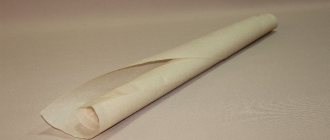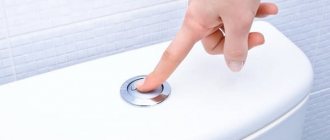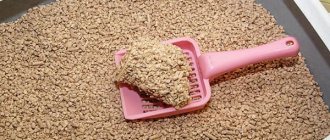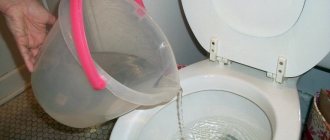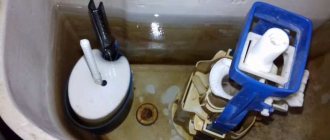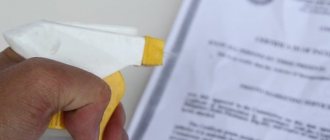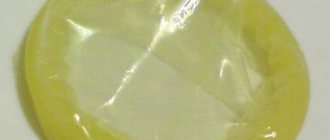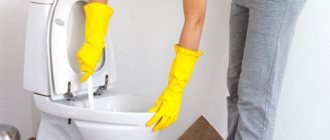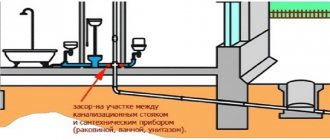The debate about whether it's okay to throw toilet paper down the toilet has been going on for years. In most cases, experienced plumbers take part in the discussion, but it happens that ordinary bathroom visitors also try to express their “professional” opinion. A huge number of arguments are given. Who is right? Let’s try to analyze the problem and understand: “why it’s not possible” and “what will happen next.”
Paper is different from paper
Very often, people believe that toilet paper that gets into the toilet immediately dissolves in water. In fact, only some types of paper dissolve. In most cases, it is only after a long journey through a long labyrinth of sewers that the toilet paper gradually loses its shape. It is very important to read the label carefully when purchasing this product. Modern manufacturers almost always indicate what material the paper is made of, how quickly it will dissolve in water and whether it can be thrown into the toilet. Toilet paper, of course, is made from materials that are designed to get wet very quickly. A dangerous plug that creates blockages in sewer pipes simply does not have time to form from such paper.
People living in private homes should be especially careful when purchasing toilet paper. The sewage system of an apartment building and the treatment facilities of dachas and country houses are significantly different. Most manufacturers do not recommend disposing of paper into a septic tank. But here, too, there are a number of nuances and points that refute the categoricalness of manufacturers, still giving users a chance to get rid of paper by throwing it in the toilet.
Pepsi and Cola
Popular drinks have long been used by housewives as an effective cleaning agent for plumbing fixtures. But these products can also help with minor blockages, as they are good at dissolving soft toilet paper. Unfortunately, they are unlikely to cope with denser materials (for example, landscape paper, newsprint).
It is important to remember that the use of acid-based chemical products is not recommended, as these products can seriously damage the sewer pipe, especially if it is made of plastic. Such compositions also cannot be used in country toilets; they destroy the microflora necessary for processing waste products
It is quite possible to eliminate small blockages in sewer pipes using improvised means. This will prevent the formation of a more serious congestion, which will require the help of specialists to combat.
Sewerage of an apartment building
If you ask professionals whether it is possible to flush toilet paper down the toilet, they will name several nuances. The first, which we already mentioned above, is the type and quality of toilet paper. The second point is the design of the sewer system. When paper enters the sewer system of an apartment building, it does not soak immediately, but only gradually breaks down into separate pieces and fibers. Then, picked up by the flow of water, it is sent to the collector. The next stage is pumping the contents of the collector, including toilet paper, to a specialized treatment station. This is where the toilet paper you throw down the toilet ends its journey. Its shreds and fragments settle forever in coarse filters.
As a result, small amounts of paper can be thrown into the toilet of an apartment building. Of course, a whole roll that ends up in the sewer can create a blockage.
Face masks
Few people think of throwing clay into the toilet. However, this very substance is included in many face and body masks. They have no place in the sewer system. One mask will not immediately cause problems, but several flushes will cause sediment to accumulate and clog the pipes. How to get rid of the mask:
- remove the main layer from the face with cotton pads;
- wipe the skin with a damp cloth;
- wash off the rest with water.
Some cosmetic products for the skin have a composition that would be the envy of the periodic table. Remembering the general water cycle in nature, it is worth doing the same with all these means. There is no need to pollute the environment again.
Toilet paper: to throw or not to throw into the septic tank of a private house
It would seem that the sewer system in a dacha should be similar to the sewer system in an apartment building. Only the cycle and path of human waste is a little shorter. In fact, this is a misconception. In suburban septic tanks there is completely no powerful flow of water in the sewer system. Most often, this is why blockages occur.
If in a private house the diameter of the pipeline is less than 100 mm, its length exceeds 5 meters, and the pipes have numerous bends and turns, then the owners are strictly prohibited from throwing toilet paper into the toilet. Is it possible to use special paper that quickly dissolves in water? This option is acceptable if you have complete confidence in the quality of the paper. Simple, cheap models can completely clog a septic tank. More expensive types of paper, the cost of which varies from 350 to 500 rubles, can be safely thrown into the toilet. Paper marked as Aqua Soft will not cause any problems.
Features of selection and recommendations
If you decide to flush toilet paper down the toilet, you need to choose it wisely, since the operation of the drainage system depends on its quality and ability to dissolve.
It is best to use instant toilet paper
So, what you need to pay attention to when choosing:
- The material of manufacture – it directly affects its softness. It is advisable to choose paper made from virgin raw materials (cellulose). It feels softer and dissolves better in water than a product made from recycled materials (paper and cardboard waste).
- Color – here it is advisable to choose plain, unbleached paper. The fact is that the bright colors of the product indicate that various dyes were used in its manufacture, which can cause allergies or other health problems.
- Number of layers – if you are throwing paper down the toilet, it is advisable to purchase single-layer products. In addition, they are cheaper, although not as convenient to use.
- Solubility is one of the most important indicators. If the paper dissolves well in water, then there will be no problem with weed plugs in the sewer.
Also, the choice of paper may be influenced by additional factors, such as the presence of tear-off leaves and polyethylene packaging that protects the product from moisture.
When using local or public sewer systems, residents should understand what can and cannot be flushed down the toilet or septic tank. Compliance with basic rules of use will help to avoid unnecessary problems with the sewer system and systematic blockages.
Why not?
Despite the fact that manufacturers strive to make high-quality, correct, water-soluble paper, the inscriptions “Do not throw paper into the toilet!” do not disappear, but on the contrary, appear more and more often. What is this connected with?
Firstly, these signs can very often be seen in public restrooms. They appeared back in those distant times when toilet paper was a luxury, and most people used newspapers or pages from an uninteresting book. Such paper does not dissolve in the sewer for a long time and causes blockages.
Secondly, similar inscriptions can be seen in various establishments. Despite the modern design of public toilets in restaurants, cafes, etc., the designs may differ. If small-diameter pipes are used or the pipes have a poorly maintained slope, then a clogged sewer is a matter of several weeks.
Third, public restrooms often began offering paper towels instead of paper. They are known to be more resistant to water, so they can also cause blockages if washed down the drain.
Controversial subjects
In fact, the question “what can be flushed down the toilet and what cannot?” still controversial. Discussions are especially frequent about the following 5 categories of waste:
- Leftover food, missing food. “It’s not right to pour sour borscht into the trash can, after all,” housewives are indignant at the ban on using the toilet for food disposal. In fact, you can throw borscht down the toilet, as long as it is boneless. Hard bones, like dense foods, can cause blockages. If your leftovers are hard and thick, chop them up with a knife and dilute them with water, then throw them down the toilet.
- Toilet paper. There's nothing worse than an overflowing bin of used paper. You can get rid of this unpleasant phenomenon forever if you throw toilet paper directly into the toilet. Nothing will happen if you don’t throw it too much and use the flush in a timely manner. It is best to use soft paper that dissolves quickly in water.
- Paper napkins and disposable towels. To figure out whether they can be flushed down the toilet or not, conduct an experiment. Fill a bowl with water and throw a couple of napkins into it. After 2-3 hours, stir the water with a spoon. If napkins or towels remain unharmed, do not throw them into the toilet. And if they fall into pieces or dissolve, you can wash off the wipes.
- Cat litter. In fact, you can flush the filler down the toilet, but not everyone can. The manufacturer indicates possible disposal methods on the packaging. As a rule, clumping (clay-based) and wood filler are allowed to be flushed down the toilet, but in small portions. Don't even think about emptying a full tray into the toilet!
- Medicines. Opponents of flushing out expired, unwanted tablets insist they contain chemicals that are harmful to the environment. But if you take the same “Whiteness”, washing powders, dishwashing detergents, then there is much more chemistry in them than in a handful of tablets.
What shouldn't be flushed down the drain other than toilet paper?
To prevent a toilet in a city apartment or a septic tank in a country house from causing discomfort, several conditions must be observed. In addition to low-quality toilet paper that does not dissolve well in water, it is prohibited to flush the following into the toilet:
- plastic bags;
- candy and chocolate wrappers;
- baby diapers;
- feminine hygiene products (pads and tampons);
- animal hair;
- human hair;
- construction garbage;
- multilayer paper towels;
- newspapers and magazines;
- medications and chemicals containing chlorine and leading to the death of microorganisms.
Answers from experts
You can throw it, not a roll of course, but in small pieces. It gets wet and disintegrates (try storing it in a jar of water for a couple of days, and then try to take it out, you won’t succeed. So while it goes down the drain, it disintegrates into small pieces. After getting wet.
If not bio, then CAN'T FUCK
Can. The toilet won't clog. Paper will almost dissolve in water
Strange question...) ) If not in rolls, then you can))
you can throw it, since it is specially made of fiber that dissolves in water)
Of course you can, if the paper is not cardboard
You can throw it, although if you are afraid, stick it on the walls after use, wallpaper is not needed and anyone will find the toilet by the smell...
At our work they throw everything in a row, the tube constantly gets clogged, the plumber is shocked, he says again, nah. . If you throw a piece of paper, you will swim in shit!!!! pipe diameter 5 mm.
This is a habit of Americans - even in their kitchen, a small mixer grinds up half-eaten food right in the drain hole of the kitchen sink and sends everything down the drain - that's where kitchen accidents come from in horror films!))
of course it is possible. But newspapers and magazines - no
I throw it there and it never clogs
It’s possible, but it’s better not to—maybe the hole at the toilet elbow is already so clogged (you just can’t see it, only when you remove it) that even one piece of paper can clog it. When we moved into an old house, we removed the toilet, changed it, it was terrible - the hole was almost the size of a match head - we were amazed how everything else got there!
We suggest you familiarize yourself with How to install a thermostat on a radiator
Why would I have a 5-liter bucket in the toilet with this miasma, of course I’ll flush it down the toilet...)) ) What do you think, paper of such a structure is made so that the butts are comfortable and pleasant? )))))
we throw and everything is fine. It depends on the pipes
Of course you can, you could also ask a question, is it possible, excuse me, to poop in it and suddenly it gets clogged...
maybe there's nothing wrong with it
There is a blockage. What to do?
It would seem that modern people know whether it is possible to throw toilet paper into the toilet or whether it is better not to do so. However, blockages and problems with the toilet, both for city residents and summer residents, periodically occur. How to deal with blockage? Can you deal with it yourself or is it better to immediately turn to professionals?
The easiest and most popular way to deal with clogged sewer pipes is to use a plunger. If the toilet is clogged with toilet paper, the paper plug can be easily removed using this item. If improvement does not occur, then you should move on to more radical methods. There are many cleaning devices on the market for home use. Mechanical sewer cleaning will be much more effective. As a rule, the structure consists of a cable, at the end of which a special nozzle is attached to destroy the cork. For faster and more convenient operation, some models use compact electric motors. If similar means do not cope with the task, then you will have to call a specialist who will get rid of the blockage using hydrodynamic flushing of the pipes.
When you need to call a plumber
If you know perfectly well how to remove a blockage in the toilet yourself, but all the methods have already been tested, but the result has not been achieved, then you will still have to wait for a plumber.
There is a situation in which you need to call a plumber immediately. This is when the water in the toilet continues to flow despite attempts to clear the blockage. This means that the riser is clogged below the level of your floor. When neighbors upstairs continue to drain water, the sewage will overflow the edges of the toilet and end up in your apartment. This problem can only be solved by specialists; they know how to clear a blockage in the toilet and riser.
